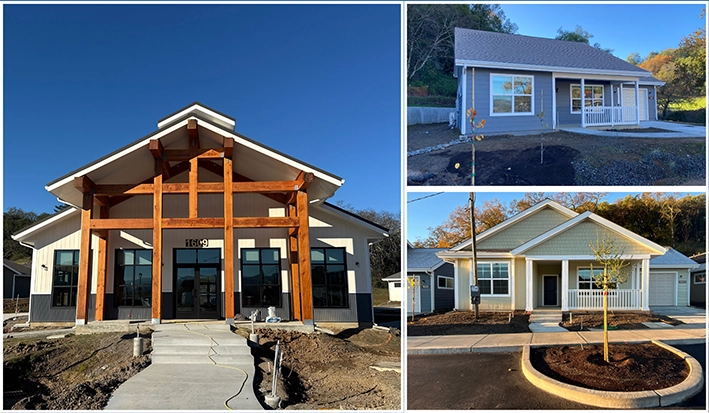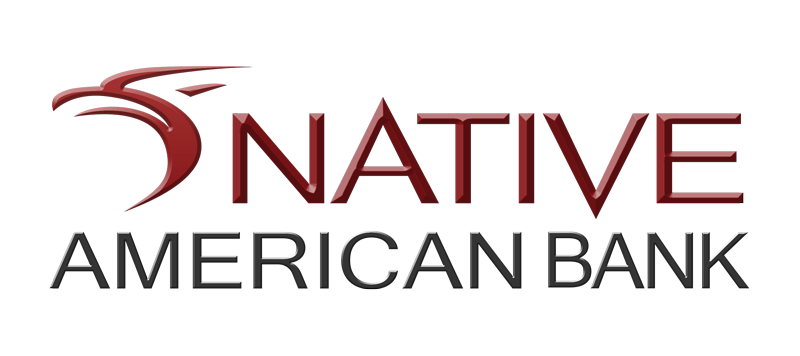
Cloverdale, CA — The Dry Creek Rancheria Band of Pomo Indians partnered with Native American Bank to secure a $4,823,000 HUD Title VI loan, providing permanent financing to complete the Tribe’s vital housing project called Bi’du Khaale. The financing will allow the Tribe to complete construction on 25 two-and three-bedroom single-family homes, helping to address the critical need for affordable housing in Sonoma County, where the median home price is approximately $800,000.
Expected to be completed this spring, the rental homes will be available to Tribal elders and multigenerational households. One of the two-bedroom units will be reserved for management.
The property will also include a 2,975-square-foot community building, which includes a fitness center, kitchen, and activity space.
“Our people have lived on these lands for thousands of years, and rising housing costs should not threaten our ability to remain here,” said Chris Wright, chairman of the Dry Creek Rancheria Band of Pomo Indians. “Securing financing through Native American Bank and the HUD Title VI program marks a significant step in fulfilling our commitment to meeting the needs of our community. This project is a step toward ensuring that our families remain here, preserving our culture and way of life for generations to come.”
Native American Bank is a Community Development Financial Institution (CDFI) which promotes economic development in areas that are underserved by traditional financial institutions. The Bank supported the Tribe with its application for the HUD Title VI loan — a loan guarantee program that was established under the Native American Housing Assistance and Self-Determination Act. It is designed to help federally recognized tribes and Tribally Designated Housing Entities secure financing for affordable housing projects.
The Bank was able to provide a competitive interest rate to the Tribe, which was supported by specific funding available and allocated for eligible tribal housing projects.
“Partnering with the Dry Creek Rancheria Band of Pomo Indians to reach their financial goals has been a privilege,” said Payton Batliner, Senior Vice President and Chief Lending Officer for Native American Bank. “Native American Bank is committed to providing solutions that allow tribal nations to empower their communities and exercise their sovereignty.”
Native American Bank’s partnership with the Dry Creek Rancheria Band of Pomo Indians strengthens its commitment to supporting affordable housing initiatives and expands its portfolio in this critical sector. In 2024, the Bank provided a $5 million loan to the Habitat for Humanity Metro Denver to renovate the future headquarters for its affordable homeownership programs. They also participated in two Low Income Housing Tax Credit projects, totaling $10 million, to provide permanent supportive housing for unhoused people and individuals in recovery in Denver and Greeley, Colorado.
Photo credit: Travois Architecture.
Contact:
Veronica Lane, Native American Bank
Vice President, Marketing Director
vlane@nabna.com
720-963-5515
About the Dry Creek Rancheria Band of Pomo Indians
The Dry Creek Rancheria Band of Pomo Indians is a Northern California Indian Tribe whose Pomo and Wappo ancestors occupied the Russian River and Dry Creek Valleys continuously and successfully for more than five thousand years. Their success was due to a sophisticated knowledge of their environment, refined arts and technologies, participation in complex trade networks, with strong family and community bonds. Learn more at drycreekrancheria.com/.
About Native American Bank
Chartered as a national community development focused bank, Native American Bank, N.A. is also a certified Community Development Financial Institution (CDFI). It is committed to being a self-sustaining CDFI and is the first national American Indian-owned community development bank in the country. Native American Bank supports the communities that it services, and it received an “outstanding” score on the most recent Community Reinvestment Act (CRA) exam. Learn more at nativeamericanbank.com.

